|
Books Should Be Free Loyal Books Free Public Domain Audiobooks & eBook Downloads |
|
|
Books Should Be Free Loyal Books Free Public Domain Audiobooks & eBook Downloads |
|
Humorous Books |
|---|
|
Book type:
Sort by:
View by:
|
By: Geoffrey Chaucer | |
|---|---|
 Chaucer Storybook
Chaucer Storybook
Geoffrey Chaucer's classic "Canterbury Tales" has here been rendered into clear and contemporary English prose. These classic stories are now available to those who would like to read them without struggling through Middle English poetry. The character and humour of The Wife of Bath and other larger-than-life people created by Chaucer are now accessible to a wider audience, including children. Please note that the original Canterbury Tales includes 24 stories, of which 11 are reproduced here. - Summary by Beth Thomas | |
By: George Ade (1866-1944) | |
|---|---|
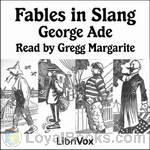 Fables in Slang
Fables in Slang
While a columnist for The Chicago Record humorist George Ade penned numerous “fables” which were subsequently collected into books. Fables in Slang is the first of these collections. It contains 26 satirical stories that lampoon phrenologists, idealists, snobs, fanatics and other ignorant fools of the day, most of which still wander through our modern lives. Jean Shepherd considered Ade a predecessor who made writers like James Thurber, Mike Royko, and himself possible. Fables in Slang was first published in 1899 by Herbert S. Stone and Company. | |
By: George Barr McCutcheon (1866-1928) | |
|---|---|
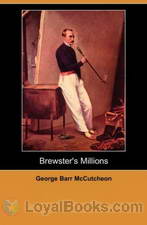 Brewster's Millions
Brewster's Millions
He hosts an all expenses paid luxury cruise to Europe for fifty guests and showers them with expensive gifts. When he's mugged in a dark alley, he insists that the thugs also take the $300 stashed away in his back pocket. He flies into a rage whenever one of his employees suggests cutting costs. Every time he places a bet, he wins, causing him even more despair! In Brewster's Millions by George Barr McCutcheon, a classic riches-to-rags tale, Montgomery Brewster is bound by the terms of an eccentric uncle's will to spend one million dollars completely within a year so that he can lay claim to an even bigger fortune... | |
 Yollop
Yollop
Mr. Crittenden Yollop makes friends with the man who came to burglarize his home and sets out to help him return to where he really wants to be...prison. This humorous satire takes a somewhat different look at prisons, criminals, the law and reformers. | |
By: George Farquhar (1677-1707) | |
|---|---|
 Sir Harry Wildair
Sir Harry Wildair
This sequel to the Jubilee [The Constant Couple, or A Trip to the Jubilee] appeared at Drury Lane in 1701, and was almost as popular as its predecessor. The smartness of the dialogue, the witty comment upon the fashions of the hour, the movement of the story, the vice and flippancy exhibited by its chief character, all specially appealed to the audience before whom it was produced, and the comedy had a run of several nights. - Cast list: Sir Harry Wildair: Peter Tucker Banter, Beau, a younger... | |
By: George Fullerton Evans (-1963) | |
|---|---|
 College Freshman's Don't Book
College Freshman's Don't Book
A short, humorous guide of what not to do in your first year of college. | |
By: George Gibbs (1870-1942) | |
|---|---|
 Maker of Opportunities
Maker of Opportunities
When you're tired only because you're bored; and you're bored only because it seems like there's really nothing worth doing; and you're so, so wealthy that one would think opportunity should be knocking at your door every day... you sometimes just have to tell your closer friends how fatiguing the life of he who has everything really is.... And then; you find your calling! | |
 Madcap
Madcap
Quote: "To the quiet Titine her mistress created an impression of bringing not only herself into the room, but also the violent horse and the whole of the out-of-doors besides." --Chapter 1 of Madcap. --In the same chapter, Hermia Challoner, this force of nature pitted against the nature of her social milieu, laughingly tells her maid, "Better die living--than be living dead." --And thus starts the beginning of an early 20th century quest for something beyond the bored and politely veiled cynicism of class and wealth; beyond oneself. --Add to that a little mischief, a bit of Puckish misdirection. And a bit of romance. | |
By: George Grossmith (1847-1912) | |
|---|---|
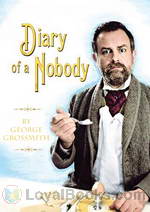 The Diary of a Nobody
The Diary of a Nobody
Grossmith’s comic novel unveils the daily chronicles of the pompous and clumsy middle-aged clerk Charles Pooter, who has just moved to the London suburb of Holloway with his wife Carrie. Nonetheless, the family’s fresh start is not quite what they had in mind. Set in the late Victorian era, the diary accurately documents the manners, customs, trends and experiences of the time. First appearing in Punch magazine through the years 1888-89, The Diary of a Nobody was first published in book form in 1892 and has entertained readers ever since... | |
By: George Horace Lorimer (1869-1937) | |
|---|---|
 Letters from a Self-Made Merchant to His Son
Letters from a Self-Made Merchant to His Son
Being the Letters written by John Graham, Head of the House of Graham & Company, Pork-Packers in Chicago, familiarly known on 'Change as "Old Gorgon Graham," to his Son, Pierrepont, facetiously known to his intimates as "Piggy." George Horace Lorimer was an American journalist and author. He is best known as the editor of The Saturday Evening Post. | |
By: George Livermore | |
|---|---|
 Take it From Dad
Take it From Dad
Take It From Dad is a collection of letters written by a father to his son, Ted, at boarding school, away from home for the first time. In each letter "Dad" comments on some aspect of Ted's experience, attitude, or behavior, illustrating and driving home his point with an entertaining tale about human nature. This book is appropriate for all ages from adolescence on, and its lessons are as relevant today as when they were written. --Lee Smalley | |
By: George Pope Morris (1802-1864) | |
|---|---|
 Will Nobody Marry Me?
Will Nobody Marry Me?
In addition to his publishing and editorial work, Morris was popular as a poet and songwriter; especially well-known was his poem-turned-song "Woodman, Spare that Tree!" His songs in particular were popular enough that Graham's Magazine in Philadelphia promised Morris $50, sight unseen, for any work he wanted to publish in the periodical. | |
By: George Wilbur Peck (1840-1916) | |
|---|---|
 Sunbeams
Sunbeams
George W. Peck was at times a writer, newspaper publisher and politician. Many of the Sunbeam essays had been published in Peck's paper, "The Sun", as amusing and often critical comments on social and political subjects, typically current in the beginning of the 1900's. Topics are often 'small town' United States, and Peck's gentle sarcasm or portrayals much resembles that of Twain. Listeners must be aware that the Spanish American War was a recent event, leading to the "Yankee" involvement in the Philippines... | |
By: Georgette Heyer | |
|---|---|
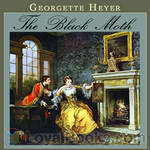 The Black Moth
The Black Moth
Jack Carstares, oldest son of the Earl Wyncham, has been disgraced by his brother. Gone for six years, living the life a highwayman he meets the woman he will fall in love with. Saving her from being kidnapped by a dastardly blackguard he is injured and must stay with her family until he is able to return to his life…will she discovery his true identity? Will he be able to leave her when the time comes? Mystery and humor follow this intriguing cast of characters until the very end. (Summary by Terra Mendoza) | |
By: Gerard Nolst Trenité | |
|---|---|
 The Chaos
The Chaos
“The Chaos” is a poem which demonstrates the irregularity of English spelling and pronunciation, written by Gerard Nolst Trenité (1870-1946), also known under the pseudonym Charivarius. It first appeared in an appendix to the author’s 1920 textbook Drop Your Foreign Accent: engelsche uitspraakoefeningen. | |
By: Gideon Wurdz (b. 1875) | |
|---|---|
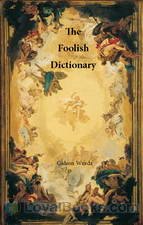 The Foolish Dictionary
The Foolish Dictionary
“The Foolish Dictionary” was written by “Gideon Wurdz” and was published in 1904. According to the beginning of the book, it is “An exhausting work of reference to un-certain English words, their origin, meaning, legitimate and illegitimate use…” This a a short but amusing dictionary which “redefines” words in some interesting ways. Funny and sometimes bizarre observations are sprinkled throughout. In keeping with the policy to read, rather than attempt to rewrite, books – even those with offensive content – nothing has been omitted... | |
By: Guy Wetmore Carryl (1873-1904) | |
|---|---|
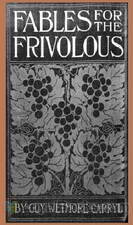 Fables for the Frivolous
Fables for the Frivolous
The Urban Rat and the Suburban Rat, The Persevering Tortoise and the Pretentious Hare, The Ambitious Fox and the Unapproachable Grapes.... If some of these titles seem vaguely familiar to you, you wouldn't be mistaken! Fables for the Frivolous by Guy Wetmore Carryl contains some well-known fables in a modern packaging, with a delightful new twist! The complete title of the original published in 1898 was Fables for the Frivolous (With apologies to La Fontaine) and it was the first published work of this gifted American journalist, humorist and poet... | |
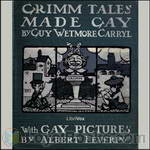 Grimm Tales Made Gay
Grimm Tales Made Gay
A comic rendering in verse of well-loved Fairy Tales of the Brothers Grimm, each ending with a moral and full of puns. The titles of the tales themselves make another verse. | |
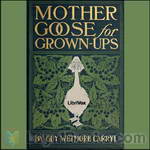 Mother Goose for Grownups
Mother Goose for Grownups
Mother Goose for Grownups is a delightfully silly collection of parodies on well-known Mother Goose tales by Guy Wetmore Carryl. | |
By: H. G. Wells | |
|---|---|
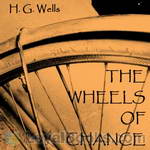 The Wheels of Chance
The Wheels of Chance
“The Wheels of Chance – A Bicycling Idyll” follows the adventures of a Drapers Assistant who, having brought an ancient bicycle, sets off on a 2 week tour of the countryside. He encounters a Lady in Grey wearing rationals (bloomers). And his world will never be the same again | |
 Love and Mr Lewisham
Love and Mr Lewisham
The teaching profession, science and politics in late 19th century England. H.G.Wells’ humorous early novel, drawing on his own life, shows how these – as well as involvement in spiritualism – have to compete with love. | |
 Sea Lady
Sea Lady
| |
 Bealby; A Holiday
Bealby; A Holiday
Bealby is the comical story of the escapade of a thirteen-year-old boy when he rebels against his placement as a steward's-room boy in the great house of an estate named Shonts and flees—not, however, before thoroughly upsetting a weekend party where the nouveau riche couple renting Shonts is entertaining the Lord Chancellor. - Summary by Wikipedia | |
 Food of the Gods, and How It Came to Earth (version 2)
Food of the Gods, and How It Came to Earth (version 2)
Mr. Bensington and Professor Redwood have invented a substance that causes living things to grow - and grow - and grow! As their experiments progress, the substance quickly gets out of control and the fun begins as insects and plants receive the benefit of the Food of the Gods. Surely nobody would dream of feeding such a thing to a human child… would they? In this little-known science fiction satire, Wells takes potshots at every member of society: scientists, ministers, charitable heiresses, revolutionaries, and everyone in between. Yet in the end, Wells shows his faith both in humanity and its never-ceasing progress. - Summary by Catharine Eastman | |
By: Harold Ashton (1875-1919) | |
|---|---|
 Tale of a Tank, and Other Yarns
Tale of a Tank, and Other Yarns
Harold Ashton was the War Correspondent of The Daily News during the First World War and reported extensively on the British army’s involvement in the conflict. Whether working alongside the British troops that were fighting on the frontline or in the trenches or accompanying the massive logistics operation behind the lines – be it the transporting of munitions and supplies or seeing at first hand the work of the Royal Army Medical Corps – he reported on the successes and failures, the tragedies and victories over the course of the war... | |
By: Harry Leon Wilson (1867-1939) | |
|---|---|
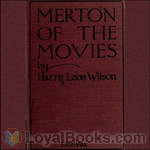 Merton of the Movies
Merton of the Movies
Merton of the Movies is a comedy that centers around Merton Gill, an aspiring dramatic artist from Simsbury, Illinois who makes his way to Hollywood to become a serious actor. How could Merton fail in attaining his dreams after finishing a correspondence course from the General Film Production Company of Stebbinsville, Arkansas, certifying him to be a competent screen actor? Harry Leon Wilson, the author, was a very popular humor writer in the first decades of the 20th century. This book was made into film several times, the last in 1947 starring Red Skelton. | |
By: Helen Rowland (1875-1950) | |
|---|---|
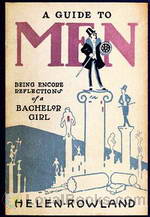 A Guide to Men: Being Encore Reflections of a Bachelor Girl
A Guide to Men: Being Encore Reflections of a Bachelor Girl
A series of occasionally witty one-liners, poems and considerations on the subject of Men, Women and their Conjunction. By turns tender, bland, sexist (in both directions!) and funny. | |
By: Henrik Ibsen (1828-1906) | |
|---|---|
 Hedda Gabler
Hedda Gabler
Hedda Gabler is a play first published in 1890 by Norwegian playwright Henrik Ibsen. In it, Hedda Gabler, daughter of an aristocratic General, has just returned from her honeymoon with George Tesman, an aspiring young academic, reliable but not brilliant, who has combined research with their honeymoon. The reappearance of Tesman’s academic rival, Eilert Lovborg, throws their lives into disarray. | |
By: Henry james (1843-1916) | |
|---|---|
 Third Person
Third Person
The Third Person is an amusing spoof on spooking. The 'ghostly man about the house' in whom two increasingly competitive maiden ladies come to take a proprietary interest is as unlikely to inspire terror as the wraith in one of James's earliest tales. The anticlimactic crisis may need a footnote for younger readers: a Tauchnitz was an unauthorized continental paperback edition of a british or american book which, purely for copyright reasons, was not supposed to be brought back to England. To think of this as smuggling certainly placed, for James's contemporaries, the crimes of the ghostly third person in a hilarious perspective. | |
By: Henry Austin Dobson (1840-1921) | |
|---|---|
 "You Bid Me Try"
"You Bid Me Try"
Henry Austin Dobson, commonly Austin Dobson, was an English poet and essayist. His official career was uneventful, but as a poet and biographer he was distinguished. Those who study his work are struck by its maturity.It was about 1864 that he turned his attention to writing original prose and verse, and some of his earliest work was his best. It was not until 1868 that the appearance of St Paul’s, a magazine edited by Anthony Trollope, gave Harry Dobson an opportunity and an audience; and during the next six years he contributed some of his favourite poems, including “Tu Quoque,” “A Gentleman of the Old School,” “A Dialogue from Plato,” and “Une Marquise... | |
By: Henry Edward Warner (1876-) | |
|---|---|
 That House I Bought; A Little Leaf From Life
That House I Bought; A Little Leaf From Life
This is a whimsical, entertaining, tongue in cheek narrative of the author’s purchase of a house, circa 1911. | |
By: Henry Fielding (1707-1754) | |
|---|---|
 The History of Tom Jones, A Foundling
The History of Tom Jones, A Foundling
Tom Jones is considered one of the first prose works describable as a novel. The novel is divided into 18 smaller books. Tom Jones is a foundling discovered on the property of a very kind, wealthy landowner, Squire Allworthy. Tom grows into a vigorous and lusty, yet honest and kind-hearted, youth. He develops affection for his neighbor’s daughter, Sophia Western. On one hand, their love reflects the romantic comedy genre popular in 18th-century Britain. However, Tom’s status as a bastard causes Sophia’s father and Allworthy to oppose their love; this criticism of class friction in society acted as a biting social commentary... | |